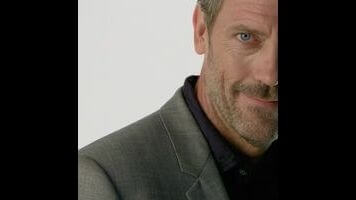House: "Not Cancer"

Confession: I don't really like House's cold opens. I find them kind of boring, to be honest. The best episodes have a medical mystery equally as compelling as all the behind-the-scenes stuff, but the reason I love the series (and I do love it; it's probably my favorite show currently airing) is the title character, and all the not-quite-as-clever people who follow in his wake. The pre-credits sequence, no matter how well it's put together, just seems like the broccoli I have to eat before I get my pie.
That said, "Not Cancer" starts strong. We get not one sick person but five, with the first four dying before anybody knows something's wrong. The montage ends with Thirteen busting into a math class and asking the teacher, Apple (Felicia Day!), if she's had a corneal transplant. Apple has, which is bad news for her–the one thing connecting all the death we've been watching is that each victim had received an organ from the same donor, and that donor gave Apple her brand new eye.
The team sets to work trying to figure out what could have killed four people, and left two–Apple and the rapidly dying Frank–in danger, while House tries to cope with the loss of Wilson. My biggest problem with "Dying Changes Everything" is that the plotline with the main characters was never really integrated into the patient-of-the-week structure that nearly every episode revolves around. "Cancer" does a much, much better job of getting the balance; not only is the mystery solid, but House plays an active part in finding the answer. Sure, there's a lot of questioning as to whether or not his judgment is clouded–he keeps saying, "It's cancer," and Foreman accuses him of using that as an excuse to contact Everbody's Favorite Oncologist–but at least he's not moping in his apartment.
After "Dying"'s intensity, the House/Wilson subplot is handled this week with a refreshingly light touch. There's a great bit when House tries to pick up a new doc buddy in the cafeteria, forcing another guy to pay for his lunch and then grilling him to see if he'll fit the requirements. It's funny, and also a reminder of House's need for structure. The familiar patient-of-the-week storylines and the change-but-not-change we see every season are as much a function of the lead doctor as they are of the show's procedural origins; House is only comfortable when his life fits the same patterns it's always fit. He misses Wilson because he needs a friend, but also because Wilson had become a fixed part of his routine. His absence leaves a hole in the day that has to be answered, and quickly.
Sometimes answers come from unexpected places. I watched "Cancer" twice, and the private investigator's entrance caught me completely off-guard the first time around. Second time, I just enjoyed how cleverly it was handled, and how unusual it is for the series. The guy just steps out of the background in the staff room, and for a second, it's like some random dude wandered on to the set. You could argue that the whole set-up–the team sitting around discussing options, the PI pretending to fiddle with the coffee maker in the background before forcing his way into the conversation–was a little twee, but I think it works. It counter-balances all the doom and gloom from both Amber's death last year and Wilson's departure; for once, we get a surprise that doesn't end with someone we like going away.
The PI's name isn't given in the ep that I could tell, but IMDB says it's "Lucas," so we'll go with that. As played by Michael Weston, Lucas represents that rarest of qualities on House: someone who has no investment in our hero, but isn't immediately turned off by his sarcasm. The three chats we get between House and Luke are terrific, as House is by turns bemused, intrigued, and frustrated. The rapport between the two is so natural for a while I was wondering if the PI would turn out to be another hallucination. (Not so far, but who knows.)

 Keep scrolling for more great stories from The A.V. Club.
Keep scrolling for more great stories from The A.V. Club.